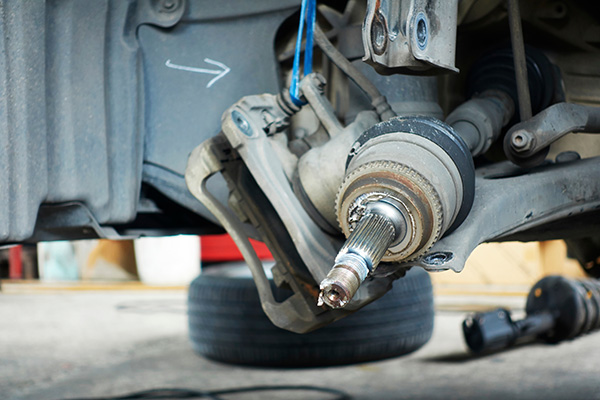
Your car’s constant velocity (CV) joints play a critical role in delivering power from the transmission to the wheels while allowing them to turn and move up and down with the suspension. Without properly functioning CV joints, your vehicle’s ability to steer and drive smoothly would be compromised.
CV joints are found on most front-wheel-drive cars and many all-wheel-drive and independent rear suspension vehicles. They are designed for durability, but over time they can wear out. Knowing the warning signs of CV joint trouble can help you avoid sudden breakdowns and costly repairs.
Clicking or Popping When Turning
One of the most recognizable symptoms of a worn outer CV joint is a clicking or popping noise when making sharp turns. This sound often gets louder as you accelerate through the turn.
The clicking is caused by worn bearings inside the joint. As the protective grease leaks out or becomes contaminated, friction increases and the joint’s internal parts begin to wear, leading to noise.
If you hear this sound consistently, it is a clear sign your CV joint should be inspected right away.
Grease on the Inside of the Wheel
The CV joint is protected by a flexible rubber boot filled with grease. If the boot tears or cracks, grease can leak out. This often ends up splattered on the inside of your wheel or along suspension components.
A damaged boot allows dirt and moisture to enter the joint, accelerating wear. If caught early, replacing the boot can save the joint. But once dirt has contaminated the grease and the joint is damaged, the only solution is replacement.
Vibration While Driving
A worn or damaged CV joint can cause noticeable vibrations that increase with speed. These vibrations are different from those caused by tire balance issues—they tend to feel more severe under acceleration.
If you notice vibrations that worsen when you step on the gas, the CV joint may be the cause. Continuing to drive this way risks further damage to the drivetrain.
Knocking or Clunking Sounds
While clicking during turns often points to outer CV joint trouble, knocking or clunking sounds when accelerating or decelerating can indicate issues with the inner CV joint.
The inner joint connects the axle to the transmission and handles the up-and-down motion of the suspension. When it wears out, the play in the joint can cause these sounds and affect your vehicle’s stability.
Difficulty Steering or Loss of Control
In extreme cases, a failed CV joint can make steering difficult or even cause the axle to disconnect from the wheel hub. This would result in an immediate loss of power to that wheel and could be dangerous if it happens while driving.
This level of failure is rare, but it underscores the importance of addressing CV joint problems early before they reach a critical point.
How to Prevent CV Joint Failure
The best way to protect your CV joints is through regular inspections. During oil changes or tire rotations, a technician can check the condition of the CV boots for cracks, tears, or leaks.
Replacing a damaged boot before the joint is contaminated is far less expensive than replacing the entire axle assembly. Keeping an eye out for grease leaks or listening for unusual noises during turns can also help catch problems early.
Why Prompt Repairs Matter
Driving with a failing CV joint can quickly lead to more severe damage and leave you stranded. Because CV joints are essential for transferring power to the wheels, failure can completely immobilize your vehicle.
Prompt repairs not only restore smooth operation but also prevent related damage to the transmission and suspension.
CV Joint Service at Hagin’s Automotive in Martinez, CA
If you hear clicking when turning, notice grease on your wheels, or feel vibrations under acceleration, it is time to have your CV joints inspected. At Hagin’s Automotive in Martinez, CA, our technicians can quickly diagnose CV joint and boot problems, recommend the right repair, and get you back on the road with confidence. Schedule your CV joint inspection today and keep your vehicle safe and smooth.